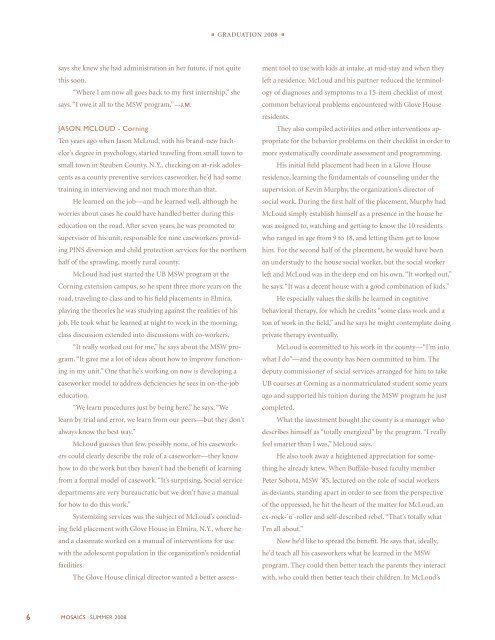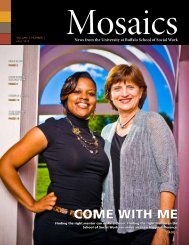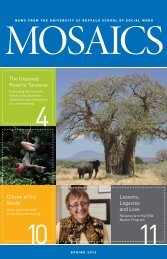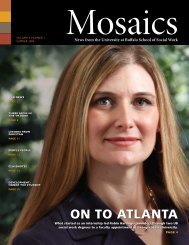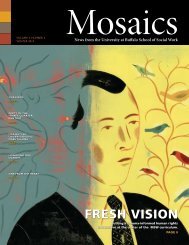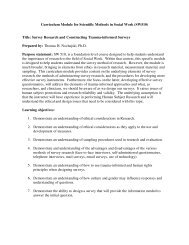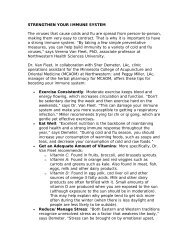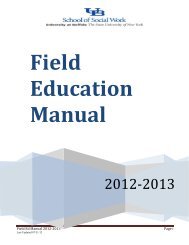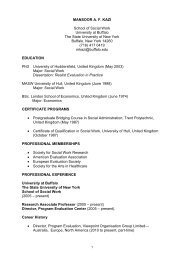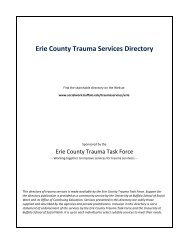Mosaics - UB School of Social Work - University at Buffalo
Mosaics - UB School of Social Work - University at Buffalo
Mosaics - UB School of Social Work - University at Buffalo
You also want an ePaper? Increase the reach of your titles
YUMPU automatically turns print PDFs into web optimized ePapers that Google loves.
gradu<strong>at</strong>ion 2008<br />
says she knew she had administr<strong>at</strong>ion in her future, if not quite<br />
this soon.<br />
“Where I am now all goes back to my first internship,” she<br />
says. “I owe it all to the MSW program.” —J.M.<br />
Jason Mcloud - Corning<br />
Ten years ago when Jason McLoud, with his brand-new bachelor’s<br />
degree in psychology, started traveling from small town to<br />
small town in Steuben County, N.Y., checking on <strong>at</strong>-risk adolescents<br />
as a county preventive services caseworker, he’d had some<br />
training in interviewing and not much more than th<strong>at</strong>.<br />
He learned on the job—and he learned well, although he<br />
worries about cases he could have handled better during this<br />
educ<strong>at</strong>ion on the road. After seven years, he was promoted to<br />
supervisor <strong>of</strong> his unit, responsible for nine caseworkers providing<br />
PINS diversion and child protection services for the northern<br />
half <strong>of</strong> the sprawling, mostly rural county.<br />
McLoud had just started the <strong>UB</strong> MSW program <strong>at</strong> the<br />
Corning extension campus, so he spent three more years on the<br />
road, traveling to class and to his field placements in Elmira,<br />
playing the theories he was studying against the realities <strong>of</strong> his<br />
job. He took wh<strong>at</strong> he learned <strong>at</strong> night to work in the morning;<br />
class discussion extended into discussions with co-workers.<br />
“It really worked out for me,” he says about the MSW program.<br />
“It gave me a lot <strong>of</strong> ideas about how to improve functioning<br />
in my unit.” One th<strong>at</strong> he’s working on now is developing a<br />
caseworker model to address deficiencies he sees in on-the-job<br />
educ<strong>at</strong>ion.<br />
“We learn procedures just by being here,” he says. “We<br />
learn by trial and error, we learn from our peers—but they don’t<br />
always know the best way.”<br />
McLoud guesses th<strong>at</strong> few, possibly none, <strong>of</strong> his caseworkers<br />
could clearly describe the role <strong>of</strong> a caseworker—they know<br />
how to do the work but they haven’t had the benefit <strong>of</strong> learning<br />
from a formal model <strong>of</strong> casework. “It’s surprising. <strong>Social</strong> service<br />
departments are very bureaucr<strong>at</strong>ic but we don’t have a manual<br />
for how to do this work.”<br />
Systemizing services was the subject <strong>of</strong> McLoud’s concluding<br />
field placement with Glove House in Elmira, N.Y., where he<br />
and a classm<strong>at</strong>e worked on a manual <strong>of</strong> interventions for use<br />
with the adolescent popul<strong>at</strong>ion in the organiz<strong>at</strong>ion’s residential<br />
facilities.<br />
The Glove House clinical director wanted a better assessment<br />
tool to use with kids <strong>at</strong> intake, <strong>at</strong> mid-stay and when they<br />
left a residence. McLoud and his partner reduced the terminology<br />
<strong>of</strong> diagnoses and symptoms to a 15-item checklist <strong>of</strong> most<br />
common behavioral problems encountered with Glove House<br />
residents.<br />
They also compiled activities and other interventions appropri<strong>at</strong>e<br />
for the behavior problems on their checklist in order to<br />
more system<strong>at</strong>ically coordin<strong>at</strong>e assessment and programming.<br />
His initial field placement had been in a Glove House<br />
residence, learning the fundamentals <strong>of</strong> counseling under the<br />
supervision <strong>of</strong> Kevin Murphy, the organiz<strong>at</strong>ion’s director <strong>of</strong><br />
social work. During the first half <strong>of</strong> the placement, Murphy had<br />
McLoud simply establish himself as a presence in the house he<br />
was assigned to, w<strong>at</strong>ching and getting to know the 10 residents<br />
who ranged in age from 9 to 18, and letting them get to know<br />
him. For the second half <strong>of</strong> the placement, he would have been<br />
an understudy to the house social worker, but the social worker<br />
left and McLoud was in the deep end on his own. “It worked out,”<br />
he says. “It was a decent house with a good combin<strong>at</strong>ion <strong>of</strong> kids.”<br />
He especially values the skills he learned in cognitive<br />
behavioral therapy, for which he credits “some class work and a<br />
ton <strong>of</strong> work in the field,” and he says he might contempl<strong>at</strong>e doing<br />
priv<strong>at</strong>e therapy eventually.<br />
McLoud is committed to his work in the county—“I’m into<br />
wh<strong>at</strong> I do”—and the county has been committed to him. The<br />
deputy commissioner <strong>of</strong> social services arranged for him to take<br />
<strong>UB</strong> courses <strong>at</strong> Corning as a nonm<strong>at</strong>ricul<strong>at</strong>ed student some years<br />
ago and supported his tuition during the MSW program he just<br />
completed.<br />
Wh<strong>at</strong> the investment bought the county is a manager who<br />
describes himself as “totally energized” by the program. “I really<br />
feel smarter than I was,” McLoud says.<br />
He also took away a heightened appreci<strong>at</strong>ion for something<br />
he already knew. When <strong>Buffalo</strong>-based faculty member<br />
Peter Sobota, MSW ’85, lectured on the role <strong>of</strong> social workers<br />
as deviants, standing apart in order to see from the perspective<br />
<strong>of</strong> the oppressed, he hit the heart <strong>of</strong> the m<strong>at</strong>ter for McLoud, an<br />
ex-rock-’n’-roller and self-described rebel. “Th<strong>at</strong>’s totally wh<strong>at</strong><br />
I’m all about.”<br />
Now he’d like to spread the benefit. He says th<strong>at</strong>, ideally,<br />
he’d teach all his caseworkers wh<strong>at</strong> he learned in the MSW<br />
program. They could then better teach the parents they interact<br />
with, who could then better teach their children. In McLoud’s<br />
6 mosaics : Summer 2008


